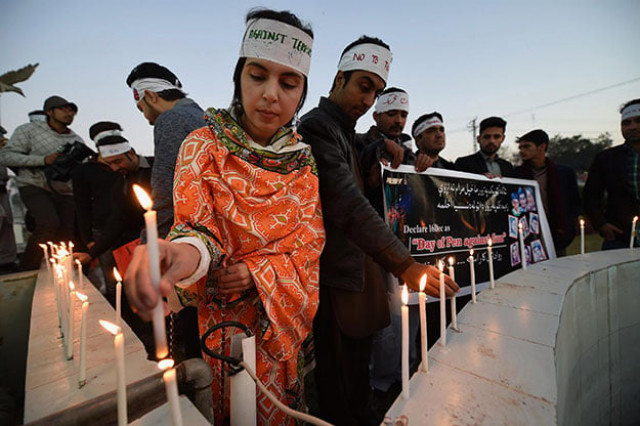After the tragedy
The APS Peshawar attack has very few parallels in history for mass murder of innocent children

PHOTO: AFP
A year on: City pays tribute to APS martyrs
The gruesome Peshawar attack, I thought, would change our leaders, society and the country for good. There is some positive change in terms of a strategic shift on how to deal with terrorism, but unfortunately it doesn’t hinge on any comprehensive vision of structural change in governance, law and reforming of politics or the functioning of institutions.
APS massacre survivors still haunted one year on
Tragedies strike every nation, but Pakistan had a fair share of these since its independence. After a tragedy, a nation may choose roughly out of two broad paths. One is to deal with the effects, make some changes here and there and then go back to the routine order of politics. Symbolic changes, half-hearted measures and political expediency never work to produce lasting effects, or even protect any gains that may be made against evils like terrorism. The second path is different. It requires major structural changes. Such changes must start with redefining the vision of society and the state. This is an eternal debate everywhere — what kind of society do we want to be? This debate never gets settled, as new issues, new challenges and new problems keep emerging. Neither political leaders nor our intellectuals have stayed focused in this debate.
132 children killed in Peshawar school attack
It is a well-beaten phrase, but a very true one that Pakistan is at a crossroads, not only geographically but more so in the historical sense, as there are changes afoot — both good and adverse — as well as opportunities that are opening up. Three lessons that have cropped up from every tragedy of the recent past must form our agenda of change, reorientation and self-redefinition as a nation. First, terrorism is both a cause and an effect. Pakistan must look at the cause while dealing with it as an effect. The current strategy in the form of the National Action Plan is comprehensive, is backed by political consensus and has a grain of vision. The issue of devoting most of the energy and resources to addressing terrorism is an effect. While we cannot ignore the effects of our past failures and policy disorientation, we need to balance this aspect with dealing with the causes of terrorism, which relate to multiple problems of state and society, such as corruption and institutional inefficiency.
APS attack convict’s death sentence challenged
Second, the real cause of most of our problems is governance, which broadly defined, refers to legal and institutional arrangements to formulate and implement laws, policies and development programmes. Political interests of the ruling groups and competing dynasties have irresponsibly subordinated the common or public interest. Governance is no longer the end, but has become a means to achieve political objectives. The effect is that once robust institutional structures of the bureaucracy, law, judiciary and the police, have gradually lost their power and autonomy from partisan political interests. The solution is in separating partisan politics from the national interest.
Finally, accountability of public office holders, of the past and present, could be the starting point of cleaning up the mess.
Published in The Express Tribune, December 16th, 2015.
Like Opinion & Editorial on Facebook, follow @ETOpEd on Twitter to receive all updates on all our daily pieces.













COMMENTS
Comments are moderated and generally will be posted if they are on-topic and not abusive.
For more information, please see our Comments FAQ